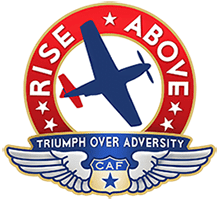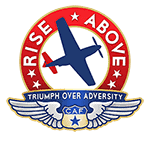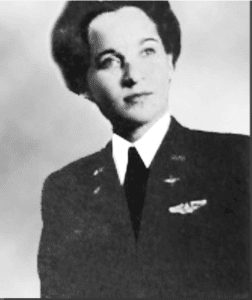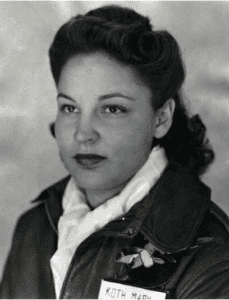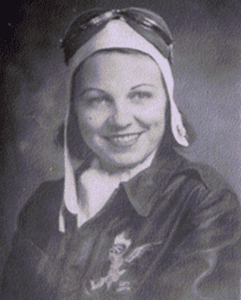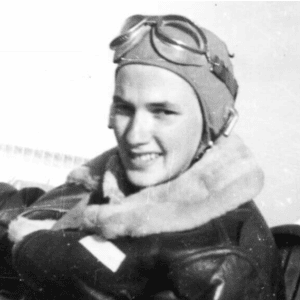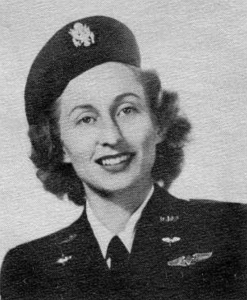 Beryl Marjorie Owens Paschich
Beryl Marjorie Owens Paschich
June 25, 1920 – May 12, 1990
Class: 44-W-3
Training Location: Avenger Field (Sweetwater, Tex.)
Assigned Bases: Dodge City Army Air Base (Kan.) and Majors Army Air Field (Greenville, Tex.)
Planes flown: PT-17, BT-13, AT-6
“Watch your air speed. Watch your air speed.” Beryl Owens’ assigned flight instructor on the AT-6 was fond of saying “watch your air speed,” but Owens did not know what to do with her air speed when she “watched it.” Frustrated, she went to her mentor, a civilian flight instructor who had taken her under his wing. She told him she had not figured out how to correct the air speed to the instructor’s liking and asked him what she should do. A short response came from her mentor. “Ask for a change of instructor.”
Owens received a new instructor, a short man who had to sit on four cushions inside the AT-6, and she finished her training. This experience summarizes Owens’ experience as a WASP. She was always progressing even if an obstacle came her way.
Owens began her journey as a pilot in San Antonio, TX when she was a volunteer with the Ground Observer Corps. She noticed a sign asking, “All women interested in flying or aviation come to a meeting of the Texas Wing of Women Flyers.” Owens joined the group she referred to as a “flying club” of “maybe 12 to 15” members. The group invited Jacqueline Cochran, the head of the Women Army Service Pilots (WASP) to speak. Owens was hooked. She worked to get her flight hours up to the standard and applied for entry.
Owens met her first obstacle with the application. Other women she knew had been accepted for training, but Owens had not heard from Cochran or anyone with the WASP. Fortunately, a friend she met in Washington, DC had become Cochran’s secretary. Owens wrote a letter asking, “what’s happened to my application?” Her friend searched, and found it buried on Cochran’s desk. She was accepted for training.
Upon arrival to the training field in Sweetwater, TX, Owens received her uniform— “mechanic’s overalls…the olive drab ones and they were like ten sizes too big.” The women jokingly referred to them as “zoot suits,” referencing the baggy suits that had been trendy among African American and Latino men. The “really swanky uniforms” would have to wait until graduation.
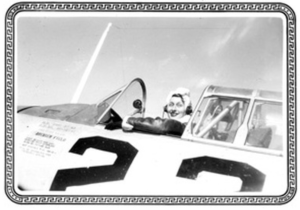 During her training, Owens flew the PT-19, Stearman, AT-6, and BT-13. She hoped to fly a B-26, but every time she got close, the assignment changed. She spent most of her time as a pilot at Majors Field in Greenville, TX. At the field, she would pilot BT-13s that had undergone repair. An observer would fly with her in the repaired aircraft. “They would take some tape and a piece of string about two feet long, maybe 18”, and tape these pieces of string all over the wings and the flying surfaces at maybe a foot apart…they would watch and if there were eddies when those strings went around they knew there was something wrong in that spot.”
During her training, Owens flew the PT-19, Stearman, AT-6, and BT-13. She hoped to fly a B-26, but every time she got close, the assignment changed. She spent most of her time as a pilot at Majors Field in Greenville, TX. At the field, she would pilot BT-13s that had undergone repair. An observer would fly with her in the repaired aircraft. “They would take some tape and a piece of string about two feet long, maybe 18”, and tape these pieces of string all over the wings and the flying surfaces at maybe a foot apart…they would watch and if there were eddies when those strings went around they knew there was something wrong in that spot.”
After the WASP were disbanded on December 20, 1944, Owens applied for a job with the FAA. She continued in that position until she married a fellow FAA employee, Jack Paschich. She resigned due to the FAA’s anti-nepotism policies, noting that “he might be my supervisor and that would never do, but it’s not that I would ever be his supervisor.” Beryl Owens Paschich received her honorable discharge in 1979 after the WASP were officially named an active-duty military unit in legislation signed in 1977.
Sources:
NAEC, Nathan Huegen, CAF VP of Education
Texas Women’s University in Denton, Texas
WWII Women Pilots
